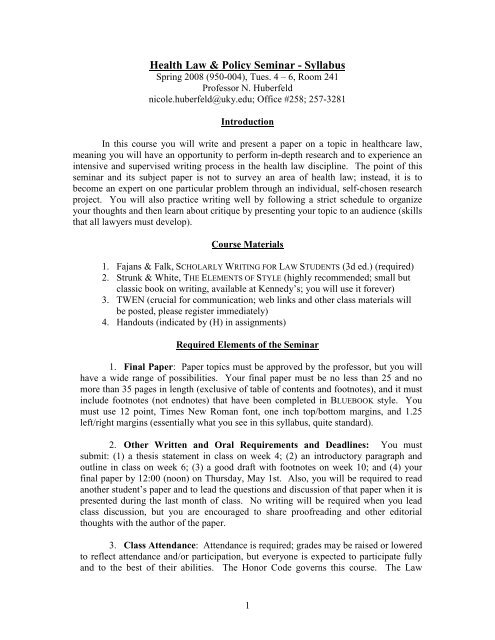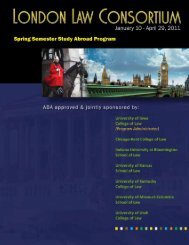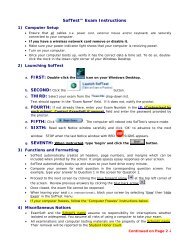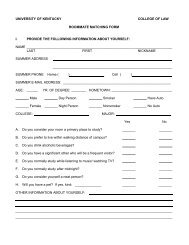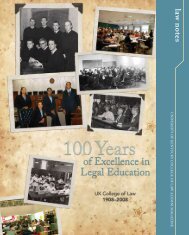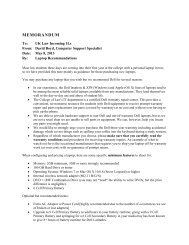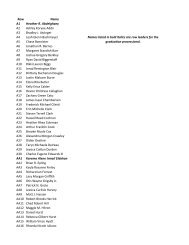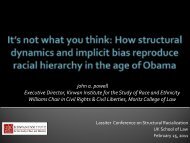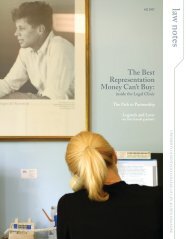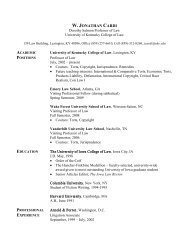Advanced Research Topics in Health Law Seminar - Syllabus
Advanced Research Topics in Health Law Seminar - Syllabus
Advanced Research Topics in Health Law Seminar - Syllabus
You also want an ePaper? Increase the reach of your titles
YUMPU automatically turns print PDFs into web optimized ePapers that Google loves.
<strong>Health</strong> <strong>Law</strong> & Policy Sem<strong>in</strong>ar - <strong>Syllabus</strong><br />
Spr<strong>in</strong>g 2008 (950-004), Tues. 4 – 6, Room 241<br />
Professor N. Huberfeld<br />
nicole.huberfeld@uky.edu; Office #258; 257-3281<br />
Introduction<br />
In this course you will write and present a paper on a topic <strong>in</strong> healthcare law,<br />
mean<strong>in</strong>g you will have an opportunity to perform <strong>in</strong>-depth research and to experience an<br />
<strong>in</strong>tensive and supervised writ<strong>in</strong>g process <strong>in</strong> the health law discipl<strong>in</strong>e. The po<strong>in</strong>t of this<br />
sem<strong>in</strong>ar and its subject paper is not to survey an area of health law; <strong>in</strong>stead, it is to<br />
become an expert on one particular problem through an <strong>in</strong>dividual, self-chosen research<br />
project. You will also practice writ<strong>in</strong>g well by follow<strong>in</strong>g a strict schedule to organize<br />
your thoughts and then learn about critique by present<strong>in</strong>g your topic to an audience (skills<br />
that all lawyers must develop).<br />
Course Materials<br />
1. Fajans & Falk, SCHOLARLY WRITING FOR LAW STUDENTS (3d ed.) (required)<br />
2. Strunk & White, THE ELEMENTS OF STYLE (highly recommended; small but<br />
classic book on writ<strong>in</strong>g, available at Kennedy’s; you will use it forever)<br />
3. TWEN (crucial for communication; web l<strong>in</strong>ks and other class materials will<br />
be posted, please register immediately)<br />
4. Handouts (<strong>in</strong>dicated by (H) <strong>in</strong> assignments)<br />
Required Elements of the Sem<strong>in</strong>ar<br />
1. F<strong>in</strong>al Paper: Paper topics must be approved by the professor, but you will<br />
have a wide range of possibilities. Your f<strong>in</strong>al paper must be no less than 25 and no<br />
more than 35 pages <strong>in</strong> length (exclusive of table of contents and footnotes), and it must<br />
<strong>in</strong>clude footnotes (not endnotes) that have been completed <strong>in</strong> BLUEBOOK style. You<br />
must use 12 po<strong>in</strong>t, Times New Roman font, one <strong>in</strong>ch top/bottom marg<strong>in</strong>s, and 1.25<br />
left/right marg<strong>in</strong>s (essentially what you see <strong>in</strong> this syllabus, quite standard).<br />
2. Other Written and Oral Requirements and Deadl<strong>in</strong>es: You must<br />
submit: (1) a thesis statement <strong>in</strong> class on week 4; (2) an <strong>in</strong>troductory paragraph and<br />
outl<strong>in</strong>e <strong>in</strong> class on week 6; (3) a good draft with footnotes on week 10; and (4) your<br />
f<strong>in</strong>al paper by 12:00 (noon) on Thursday, May 1st. Also, you will be required to read<br />
another student’s paper and to lead the questions and discussion of that paper when it is<br />
presented dur<strong>in</strong>g the last month of class. No writ<strong>in</strong>g will be required when you lead<br />
class discussion, but you are encouraged to share proofread<strong>in</strong>g and other editorial<br />
thoughts with the author of the paper.<br />
3. Class Attendance: Attendance is required; grades may be raised or lowered<br />
to reflect attendance and/or participation, but everyone is expected to participate fully<br />
and to the best of their abilities. The Honor Code governs this course. The <strong>Law</strong><br />
1
School’s rules regard<strong>in</strong>g class attendance apply; a student who misses 25% or more of<br />
the classes <strong>in</strong> this course will be disqualified automatically from receiv<strong>in</strong>g credit for the<br />
course. The class will not meet while you are writ<strong>in</strong>g, which means you may have<br />
TWO unexcused absences. Meet<strong>in</strong>gs to discuss your papers dur<strong>in</strong>g the outl<strong>in</strong>e/draft<br />
stage are also required and will be scheduled at the appropriate po<strong>in</strong>t <strong>in</strong> the semester.<br />
Also, please plan that the last four classes, dur<strong>in</strong>g which students present their papers,<br />
will take the entire 4:00 – 6:00 time period (this is necessary to give everyone an equal<br />
opportunity for present<strong>in</strong>g and then answer<strong>in</strong>g questions).<br />
4. Grad<strong>in</strong>g: Failure to complete all assignments may result <strong>in</strong> a fail<strong>in</strong>g grade.<br />
Work may not be submitted by e-mail unless an advance request is made and explicit<br />
permission received from the professor. Late work will receive a grade of 0 (unless<br />
truly exceptional circumstances exist). Assignment values are as follows:<br />
Thesis statement: 5%<br />
Outl<strong>in</strong>e: 15%<br />
Good draft: 30%<br />
F<strong>in</strong>al paper: 35%<br />
In-class presentation: 10%<br />
Class participation: 5% (This <strong>in</strong>cludes but is not limited to general<br />
participation <strong>in</strong> class discussions, preparedness for <strong>in</strong>formal paper discussions,<br />
and preparedness for lead<strong>in</strong>g assigned discussions dur<strong>in</strong>g <strong>in</strong>-class presentations.)<br />
Weekly Assignments<br />
WEEK 1 (1/8/07): Introduction to Scholarly Writ<strong>in</strong>g and Choos<strong>in</strong>g a Topic<br />
Read<strong>in</strong>g Assignment: SCHOLARLY WRITING FOR LAW STUDENTS (here<strong>in</strong>after<br />
SWLS), Chs. 1 & 2; (H) George J. Annas, “Culture of Life” Politics at the<br />
Bedside – The Case of Terri Schiavo, NEW ENG. J. MED. 352:16, 1710 (April 21,<br />
2005); (H) George J. Annas, “I Want to Live”: Medic<strong>in</strong>e Betrayed by Ideology <strong>in</strong><br />
the Political Debate over Terri Schiavo, 35 STETSON L. REV. 49 (2005)<br />
WEEK 2 (1/15/07): <strong>Research</strong><strong>in</strong>g Your Topic<br />
Read<strong>in</strong>g Assignment: Read the syllabus; SWLS Ch. 3; (H) Jill R. Horwitz,<br />
Mak<strong>in</strong>g Profits and Provid<strong>in</strong>g Care: Compar<strong>in</strong>g Nonprofit, For-Profit, and<br />
Government Hospitals, HEALTH AFFAIRS (May/June 2005); (H) John D. Blum,<br />
Feng Shui and the Restructur<strong>in</strong>g of the Hospital Corporation: A Call for Change<br />
<strong>in</strong> the Face of the Medical Error Epidemic, 14 HEALTH MATRIX 5 (2004)<br />
WEEK 3 (1/22/07): The Writ<strong>in</strong>g Process<br />
Read<strong>in</strong>g Assignment: SWLS Ch. 4 & 5; (H) Paul Starr, THE SOCIAL<br />
TRANSFORMATION OF AMERICAN MEDICINE, ToC and Part 1 Ch. 5 – The<br />
Boundaries of Public <strong>Health</strong>; (H) Abigail C. Saguy, Kev<strong>in</strong> W. Riley, Weigh<strong>in</strong>g<br />
Both Sides: Morality, Mortality and Fram<strong>in</strong>g Contests over Obesity, 30 J.<br />
HEALTH POL. POL'Y & L. 869 (2005)<br />
2
WEEK 4 (1/29/07): Thesis Statements Due at the Beg<strong>in</strong>n<strong>in</strong>g of Class<br />
The thesis statement is a short description of your paper topic (less than one<br />
page). It should convey to the reader your idea, what you believe is true and/or<br />
<strong>in</strong>terest<strong>in</strong>g about your idea, and how you <strong>in</strong>tend to explore your idea. Be prepared to<br />
<strong>in</strong>formally discuss your thesis statement with the class.<br />
Read<strong>in</strong>g Assignment: SWLS Ch. 6<br />
WEEK 5 (2/5/07): Work on <strong>in</strong>troduction with outl<strong>in</strong>e; class will not meet.<br />
WEEK 6 (2/12/07): Introduction and Outl<strong>in</strong>e Due at Beg<strong>in</strong>n<strong>in</strong>g of Class<br />
Your <strong>in</strong>troduction and outl<strong>in</strong>e should be about 2-3 pages <strong>in</strong> length, and it must<br />
<strong>in</strong>clude a draft <strong>in</strong>troductory paragraph followed by an outl<strong>in</strong>e of the organization of your<br />
paper. Your outl<strong>in</strong>e should <strong>in</strong>clude what you will discuss, why you have chosen your<br />
particular areas of discussion, and what conclusions you believe you will draw. Be<br />
prepared to <strong>in</strong>formally discuss the substance and organization of your outl<strong>in</strong>e and how<br />
your cont<strong>in</strong>u<strong>in</strong>g research has modified your <strong>in</strong>itial thesis statement.<br />
WEEK 7 (2/19/07): Write! Individual meet<strong>in</strong>gs to discuss outl<strong>in</strong>es and progress.<br />
WEEK 8 (2/26/07): Keep writ<strong>in</strong>g!<br />
WEEK 9 (3/4/07): Keep writ<strong>in</strong>g!<br />
WEEK 10 (3/11/07): Spr<strong>in</strong>g Break (should be edit<strong>in</strong>g and re-writ<strong>in</strong>g your good draft).<br />
WEEK 11 (3/18/07): Two copies of your good draft are due at the beg<strong>in</strong>n<strong>in</strong>g of<br />
class. This is not a rough draft, nor should it be your first draft; do not turn <strong>in</strong> work<br />
product that you have never read <strong>in</strong> hard copy and edited. The good draft must conta<strong>in</strong><br />
your best effort at footnotes at this stage.<br />
The order of presentations will be determ<strong>in</strong>ed; assignments will be given for<br />
discussion leaders, and one copy of your good draft will be given to your assigned<br />
discussion leader <strong>in</strong> class.<br />
Read<strong>in</strong>g Assignment: Please read SWLS Chs. 7 & 8 before you beg<strong>in</strong> the rewrit<strong>in</strong>g<br />
process for your f<strong>in</strong>al paper.<br />
WEEKS 12 (3/25) – 15 (4/15): In-class presentations. Each 15-20 m<strong>in</strong>ute presentation<br />
will be followed by a 10 m<strong>in</strong>ute discussion, which is to be lead by the student assigned to<br />
read that presenter’s paper. Power po<strong>in</strong>t, other visual aids, and/or handouts may be used<br />
but are not required. Please let me know if you require assistance with such materials for<br />
your presentation.<br />
Two stapled copies of your f<strong>in</strong>al paper are due <strong>in</strong> my office or my mailbox by<br />
NOON on Thursday, May 1 st (the day before graduation).<br />
Please see the last page of the syllabus for the University’s rule regard<strong>in</strong>g plagiarism.<br />
3
10 COMMON WRITING ERRORS COMMITTED BY STUDENTS<br />
1. A quote should only be used if the author’s expression is unique, mean<strong>in</strong>g you cannot<br />
possibly summarize the language and do it justice. The general rule is to avoid quotes,<br />
not to <strong>in</strong>clude them.<br />
2. “Id.” is a sentence unto itself; <strong>in</strong> other words, a period must come after id. (and at the<br />
end of every footnote).<br />
3. If your sentence conta<strong>in</strong>s a quote, and that quote ends the sentence, the period is<br />
placed <strong>in</strong>side the quotes, and the footnote superscript is placed OUTSIDE the quotation<br />
marks.<br />
4. Do not use contractions (don’t, isn’t, can’t). They are <strong>in</strong>appropriate <strong>in</strong> all forms of<br />
formal writ<strong>in</strong>g (anyth<strong>in</strong>g you write as a practic<strong>in</strong>g lawyer).<br />
5. Spell out all numbers under 100 (see the CHICAGO MANUAL OF STYLE, available <strong>in</strong> our<br />
library).<br />
6. When enumerat<strong>in</strong>g a thought, first, second, etc., do not change the numbers <strong>in</strong>to<br />
adverbs (firstly, secondly).<br />
7. Avoid nondescript verbiage, such as get, th<strong>in</strong>g, and <strong>in</strong>terest<strong>in</strong>g; it weakens your<br />
writ<strong>in</strong>g.<br />
8. Avoid common colloquialisms:<br />
It is important to<br />
The fact that<br />
On top of (the author almost never actually means this)<br />
In regards to (<strong>in</strong>correct grammar: the correct phrase is “with regard to”)<br />
S<strong>in</strong>ce rather than because (s<strong>in</strong>ce <strong>in</strong>dicates temporal concerns, it is not<br />
<strong>in</strong>terchangeable with because)<br />
9. The passive voice should be used spar<strong>in</strong>gly and <strong>in</strong>tentionally.<br />
10. Proofread your writ<strong>in</strong>g on paper, not on a screen, errors are caught more easily.<br />
Also, do not rely on ‘spellcheck’ and ‘grammarcheck’ to proofread for you. Spellcheck<br />
does not know the difference between actual words that have very different mean<strong>in</strong>gs, for<br />
<strong>in</strong>stance “possess” and “posses” or “the” and “them.” The reader can <strong>in</strong>stantly see when<br />
a paper has not been properly proofread, and the author loses credibility.<br />
For more such <strong>in</strong>formation, see Strunk & White, THE ELEMENTS OF STYLE and the<br />
CHICAGO MANUAL OF STYLE.<br />
4
The full text of the rule on Plagiarism is as follows (and can be found at this web l<strong>in</strong>k<br />
http://www.uky.edu/StudentAffairs/Code/part2.htm):<br />
6.3.1 PLAGIARISM All academic work, written or otherwise, submitted by students to<br />
their <strong>in</strong>structors or other academic supervisors, is expected to be the result of their own<br />
thought, research, or self-expression. In cases where students feel unsure about a question<br />
of plagiarism <strong>in</strong>volv<strong>in</strong>g their work, they are obliged to consult their <strong>in</strong>structors on the<br />
matter before submission.<br />
When students submit work purport<strong>in</strong>g to be their own, but which <strong>in</strong> any way borrows<br />
ideas, organization, word<strong>in</strong>g or anyth<strong>in</strong>g else from another source without appropriate<br />
acknowledgment of the fact, the students are guilty of plagiarism.<br />
Plagiarism <strong>in</strong>cludes reproduc<strong>in</strong>g someone else's work, whether it be published article,<br />
chapter of a book, a paper from a friend or some file, or whatever.<br />
Plagiarism also <strong>in</strong>cludes the practice of employ<strong>in</strong>g or allow<strong>in</strong>g another person to alter or<br />
revise the work which a student submits as his/her own, whoever that other person may<br />
be. Students may discuss assignments among themselves or with an <strong>in</strong>structor or tutor,<br />
but when the actual work is done, it must be done by the student, and the student alone.<br />
When a student's assignment <strong>in</strong>volves research <strong>in</strong> outside sources or <strong>in</strong>formation, the<br />
student must carefully acknowledge exactly what, where and how he/she has employed<br />
them. If the words of someone else are used, the student must put quotation marks around<br />
the passage <strong>in</strong> question and add an appropriate <strong>in</strong>dication of its orig<strong>in</strong>. Mak<strong>in</strong>g simple<br />
changes while leav<strong>in</strong>g the organization, content and phraseology <strong>in</strong>tact is plagiaristic.<br />
However, noth<strong>in</strong>g <strong>in</strong> these Rules shall apply to those ideas which are so generally and<br />
freely circulated as to be a part of the public doma<strong>in</strong>.<br />
5


